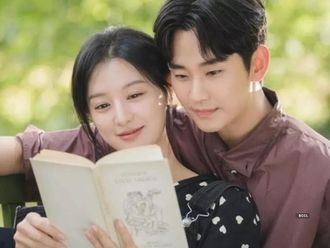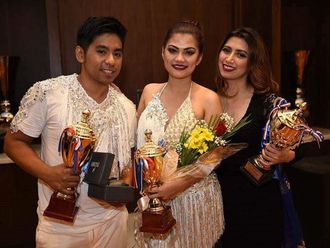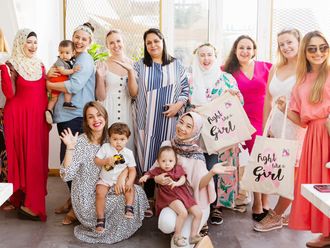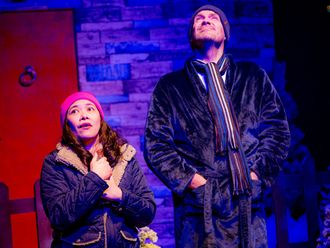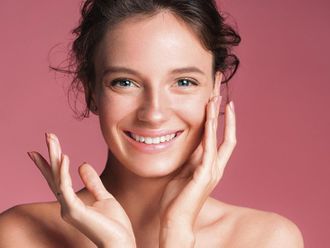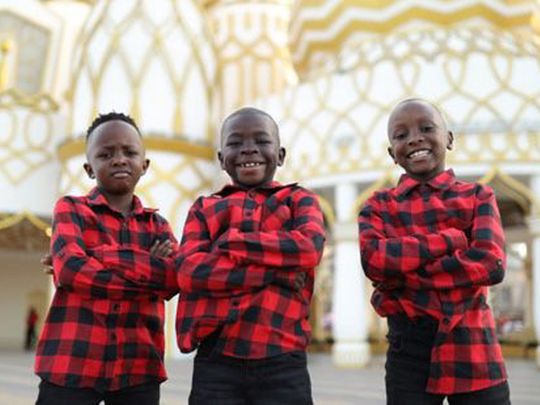
Lost childhoods. War. Famine. Disease. The legacy Uganda’s children bear is heavy but the NGO Masaka Kids Africana is helping ease that burden to some extent through the joy of dance and music.
And for the very first time, children from the NGO performed at the Kids Theatre in Global Village, as part of Children’s Day celebrations recently.
Meet the stars
Six-year-olds Kaggwa Johnbosco and Kakooza Muhammad and the five-year-old Prince Suuna Ayaan are similarly dressed in tartan red shirts with smiles on their faces as they arrive at the Global Village in Dubai. The social media stars of Masaka Kids Africana, an NGO based in the Masaka district of Uganda, had just been on some amusement rides and were getting ready for their dance performance, at the theatre. Dressed in white t-shirts and with ID cards around their necks, two men follow them closely, who look like they’re in their late 30s. Like how a parent would fuss over their child, the men, who were from the NGO to accompany the children to their first-ever trip to the UAE, usher the children onto the stage.
The children sat at the edge of the stage and dangled their legs, as the men from the Ugandan non-governmental organisation (NGO) – Suuna Hassan, CEO, director and founder of Masaka Kids Africana and choreographer Kityamuwesi John or ‘Johnny’ crouch on the floor below. I sit next to Johnny who tells me that like a shadow, he follows the children and Hassan everywhere they go. The children look at Johnny and begin to giggle, their faces beaming with happiness - a sight that spreads a smile on all our faces.
However, you can also see sadness in Johnny’s eyes, who tells me that there are over 25 children in the NGO who dance and sing – as you would’ve seen on their social media account masakakidsafricana that boasts over five million followers online.
“Today, we brought only three children to perform in Global Village and they represent the children who’ve stayed behind in Masaka,” says Johnny.
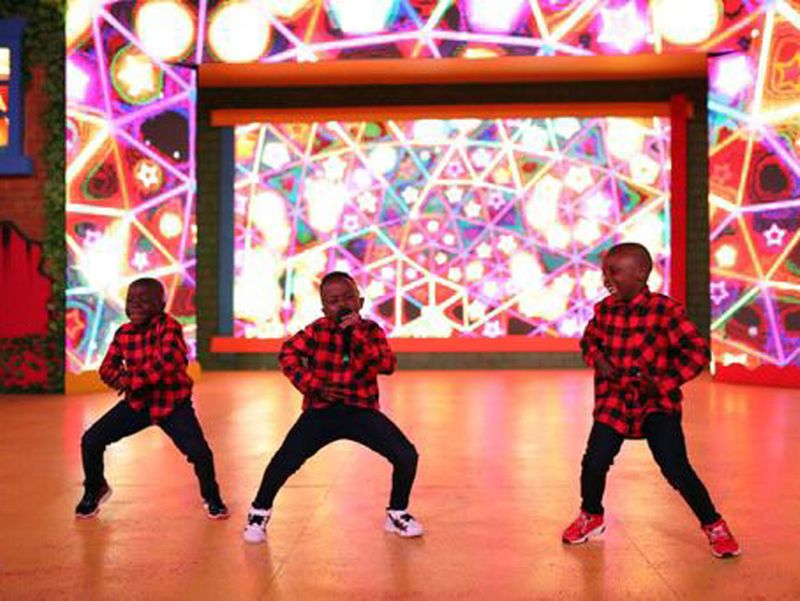
Doctors, teachers and music
I ask the children a few questions, but they only smile and seem to look at Johnny for a kind of approval. Johnny insists that they speak to me directly in English and that’s when I learn their names and age and how little Johnbosco wants to grow up to be a lawyer. “I learned that justice is important and I want to help my people,” he says.
“I want to be a doctor to help my people and look after them,” says Muhammad. Ayaan wants to be a musician because he “loves to sing and dance”.
I want to be a doctor to help my people and look after them.
At no point in our conversation does anyone call the Masaka Kids Africana organisation an NGO, instead Hassan and Johnny call it “home” and its members, “a community”.
I want to be a lawyer. learned that justice is important and I want to help my people.
“At our home, we have more than 25 children from over 10 tribes, who have lost either one or both parents and have gone through some of the worst experiences a child could face. We care for them all and in our community, we have a program that is called the Community Empowering Programme, through which, we help many children in Africa. There are a lot of orphans, many that live on the streets and they all need help.
"There are over two million orphan children in Uganda. Poverty, famine, disease and civil conflicts are taking lives away. We’re trying to help as many of these young people as we can. We give children a home and access to education and medical care. We focus on giving children life skills that they need for future success.”
Always ready to sing and dance
Today, the future lawyer, doctor and musician had a 15-minutes slot to showcase their singing and dancing talent as well as a bit of acting to a crowded theatre. I ask them how long it takes to learn the steps and the children say “not very long”.
“They’re very talented and it takes just a few seconds or a few minutes for them to catch up with the choreography even if it’s something new or something that we think that they wouldn't be able to dance,” Johnny explains.

All the community members work together along with me to help come up with these steps. We upload the children’s performances on social media to spread the message that Ugandan children or any child for that matter, who has lost a lot, still has so much potential for a bright future.
“All the community members work together along with me to help come up with these steps. We upload the children’s performances on social media to spread the message that Ugandan children or any child for that matter, who has lost a lot, still has so much potential for a bright future when they get the care they deserve,” he adds.
“They have traveled to Turkey once to perform, maybe one and a half month back, but this is their first trip to the UAE,” Johnny says.
I ask the children how they were feeling before the performance and if they were enjoying their stay in the UAE. However, nothing seems difficult for the brave little trio and they don’t display any signs of nervousness, before their performance.
“I enjoy everything, it’s not difficult,” says Bosco.
“I am just feeling… well,” says Prince, while Mohammed whispers, “It’s nice.” The children said they missed home, especially their friends, as one could tell that they were used to performing along with them.
The children were going dance to songs by local Ugandan artists. “When they're performing on stage, they dress up well, in matching outfits, but when they are doing their videos back home, they bring out the image of African children. Their outfits on the videos, the colours that they wear represent the colours of their tribe and where they come from,” Johnny explains.
“We choose music and dance to bring out our children’s potential because everyone likes music. It is like medicine. If you are in a bad mood and you listen to any song, your mood changes. Music is like, a language that everyone can understand.”
Dreams and hopes
It’s just after sunset and the theatre is packed. The children are on stage and are showing off their moves. Everyone is swaying and clapping along to African tunes and every step the children take is met with cheers and more claps.
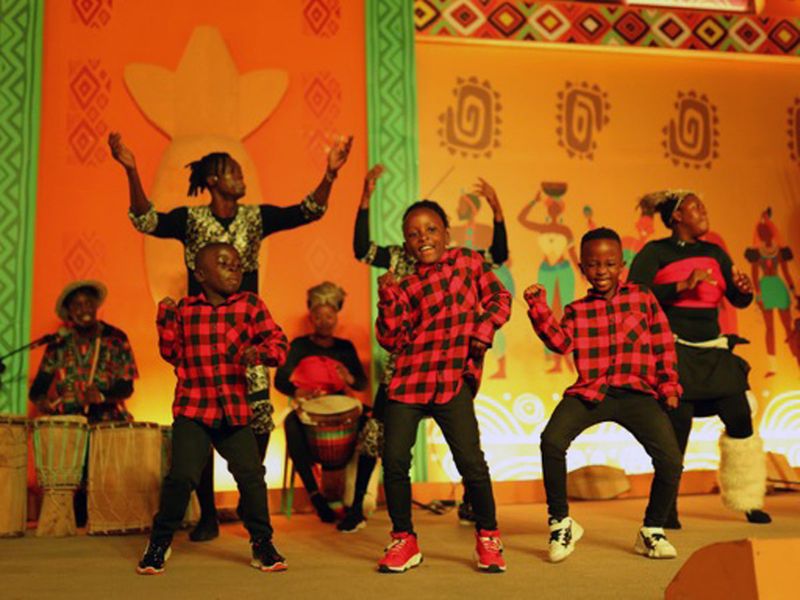
Unknowingly, there was a sense of inspiration spreading through the air to each one of us present here. The children, who are indeed gifted in the talent of dancing and singing are filled with joy and hope, without any display of angst or remorse about their lives before Masaka Kids Africana began looking after them.
After the performance, the three children meet Hassan and Suuna at the back, who are observing another group’s dance performance. Without taking his eyes off from the ongoing performance, Johnny explains that the dance troupe back home only practices when the schools are shut during the holidays or on the weekends. However not everyone in the group wants to be a dancer or a singer as the children focus.
There are those who dream of becoming teachers. They [children in Masaka Kids Africana] are always telling us that we can teach our young ones or even the elder ones in the community.
“There are those who dream of becoming teachers. They are always telling us that we can teach our young ones or even the elder ones in the community,” Johnny says.

We also do other cultural activities. All children don't have the same potential for dance and music. Even we grown-ups don't have the same intelligence. It’s whatever we know best, right?
According to Hassan, “When people see us on social media they think we only dance and sing. We also do other cultural activities. All children don't have the same potential for dance and music. Even we grown-ups don't have the same intelligence. It’s whatever we know best, right? So back home, there are those who are good in football. There are those good in tailoring. Some are good in carpentry. Others are good in poultry and farming. So our core cultural activities include these things too.
There are children who are as young as 2 years old and our instructors and I try to teach the children according to their age. Then there are children from our local villages that we cater for through the community empowering program.
“There are children who are as young as 2 years old and our instructors and I try to teach the children according to their age. Then there are children from our local villages that we cater for through the community empowering program. We care for more than 200 children from the nearby villages. We give them food and pay for them to attend school. We give them everything necessary that any child would like to have, even though resources are scarce in our place,” Johnny adds.
Leading with experience
The NGO was Hassan’s idea, who established Masaka Kids Africana in 2013 to help others. According to Johnny, Hassan was himself “a street kid”.
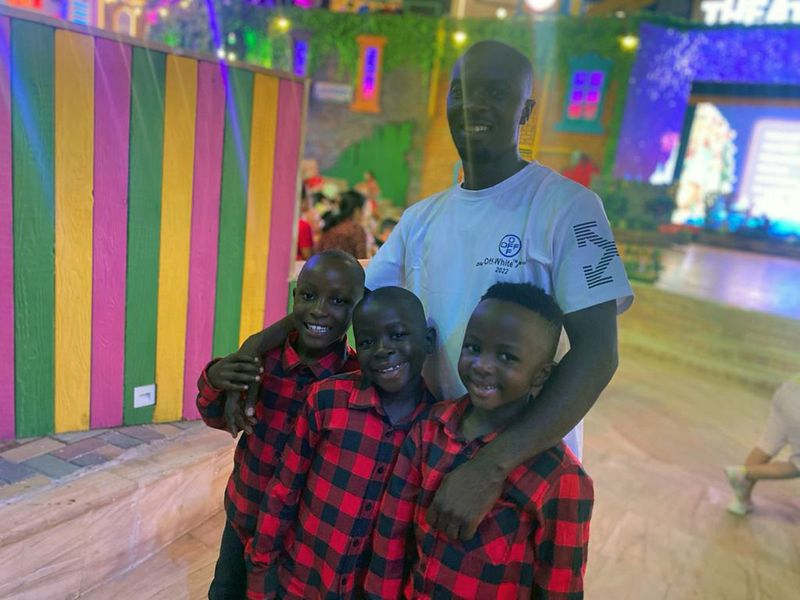
“Suuna grew up knowing everything that takes place on the street. He knew so many bad things are taking place in our region. So he thought, what can I do like to stop this? How do we remove these children that are going on the street and at least make them better people in future? How do we make these children loved by people instead of being seen as some kids on the street?
Following us on social media is another way of supporting us. Through social media, everyone can see our message, and everyone can see what we’re doing.
“Suuna wanted to lift these children up. It's not an easy thing to do. And if we can do this [support and educate the children], then others will find inspiration to support our cause.”
Hassan, who is busy engaging the children and getting them to stand together, says his message is for “everyone who has tried and wants to give up”. He speaks in his mother tongue, the Ugandan language luganda, which Johnny translates.
According to my background and even the life of these kids, it's really, really hard to live. But I never gave up. I didn't dream that one day I’ll be on one of these stages in Global Village and people will clap for them and could be happy to see them.
“I tell you not to give up. According to my background and even the life of these kids, it's really, really hard to live. But I never gave up. I didn't dream that one day I’ll be on one of these stages in Global Village and people will clap for them and could be happy to see them. I thank everyone for supporting us, everyone who likes the children’s performances and follows us. Following us on social media is another way of supporting us. Through social media, everyone can see our message, and everyone can see what we’re doing.”



